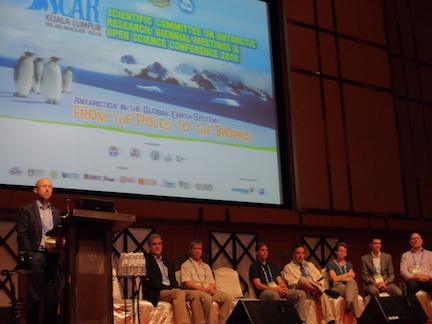
The Environmental Protocol’s 25th anniversary coincided with the Scientific Committee on Antarctic Research (SCAR) XXXIV Open Science Conference, which was held in August 2016 in Kuala Lumpur, Malaysia. A mini-symposium was organized at this conference by Dr. José Xavier (Portugal), Dr. Annick Wilmotte (Belgium), Dr. Kevin Hughes (United Kingdom) and Ms. Gabriela Roldan (New Zealand) entitled “Linking Antarctic science with environmental protection: celebrating the 25th anniversary of the Madrid Protocol”. The mini-symposium aimed to highlight the importance of the research carried out by the Antarctic science community under SCAR, to the Antarctic Treaty System (ATS), including the invaluable contribution of impartial scientific advice through the work of the Committee for Environmental Protection (CEP), particularly in environmental and conservation matters. Also, it revealed the intrinsic relationship between quality science and evidence-based policymaking. Furthermore, the presentations at the mini-symposium facilitated discussions on how Antarctic researchers can further engage with environmental issues of concern to the Antarctic Treaty System, along with identifying priorities in Antarctic policy that require quality science and effective communication between the science community and policy-makers.
The mini-symposium content:
The mini-symposium featured oral presentations from invited SCAR scientists, policy makers and members of the SCAR Standing Committee on the Antarctic Treaty System (SCATS). Prof. Jerónimo López-Martínez, in his role of president of SCAR at the time, greeted the expert guest speakers and the audience to begin the series of presentations.
Here is the list of the mini-symposium invited speakers and the titles of their presentations:
- pdf‘The Madrid Protocol and the Committee for Environmental Protection: a historical perspective’ (2.75 MB) , Dr Yves Frenot (Director of the French Polar Institute and former Chair of the CEP 2010-2014);
- pdf‘The Status of the Madrid Protocol and the challenges of today’ (1.31 MB) , Mr Ewan McIvor (Chair of the Committee for Environmental Protection, Senior Environmental Adviser for the Australian Antarctic Division);
- pdf‘Linking Antarctic science and policy: a marine perspective’ (1.08 MB) , Dr Andrew Constable (Program Leader at the Antarctic Climate and Ecosystems Cooperative Research Centre, Science advisor for Australia at CCAMLR);
- pdf‘Antarctic Environments Portal: giving your research policy impact’ (531 KB) , Ms Birgit Njåstad (Head of the Environmental Management Sector at the Norwegian Polar Institute; Project Manager of the Antarctic Environments Portal);
- pdf‘The role of SCAR in the Antarctic Treaty System – an environmental protection perspective’ (1.01 MB) , Prof Steven Chown (Head of the School of Biological Sciences at Monash University, Australia, current president of SCAR – from Aug 2016);
- pdf‘Path to Impact…how can scientists influence Antarctic policy’ (636 KB) , Dr Aleks Terauds (Senior Research Scientist and Section Head of the Biodiversity Conservation section for the Australian Antarctic Division; Standing Committee for the Antarctic Treaty System).
The video recording of the mini-symposium is available on YouTube.
See also the pdftranscript of the oral presentations (177 KB) .
Conclusions:
The presentations were followed by a panel discussion session between the audience and the guest speakers, chaired by Dr Kevin Hughes. The conclusions of the mini-symposium were summed up by Dr Jose Xavier, and here are the key points:
- The Antarctic Treaty System and the Environmental Protocol, in particular, are central to the protection and conservation of Antarctica.
- The provision of robust, evidence-based science is vital to inform policy makers in their decision-making.
- Increased two-way communication between Antarctic scientists and policy makers is essential for the transition of science into policy.
- The Antarctic Environments Portal (www.environments.aq) is a useful tool to facilitate the communication of policy-ready science information.
- Scientists have an important role in the identification of current and future conservation challenges (e.g. fisheries impacts, introduction of non-native species, climate change implications for Antarctic environments, ocean acidification, area protection and management).
- When possible, scientists should undertake multinational research to allow dissemination of findings to a wider audience in order to achieve policy change.
- Communication between policy makers and funding bodies may need to improve to ensure resources are available to fund policy-relevant science essential to the work of the CEP and ATCM.
- National delegations, CEP and SCAR-SCATS should be acknowledged for their contribution to the existing successes of the Environmental Protocol.
Resulting Publications:
- Hughes, K., Liggett, D., Roldan, G., Wilmotte, A., & Xavier, J. (2016). pdfNarrowing the science/policy gap for environmental management (40 KB) . Antarctic Science, 28(5), 325-325. doi:10.1017/S0954102016000407
